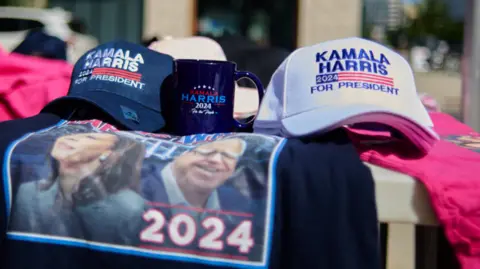 Getty Images
Getty ImagesLinkedIn: the social network for CVs, apparently motivational corporate messages and – as of late last night – transatlantic diplomatic spats.
When Sofia Patel, the Labour Party’s head of operations, posted on the site last week that she was coordinating nearly 100 current and former party officials to campaign in battleground states in the final weeks of the US presidential election, she surely could not have imagined that she would provoke a legal complaint filed in Florida.
In a formal complaint to the Federal Election Commission (FEC), the Trump presidential campaign’s deputy general counsel declared: “When representatives of the British government previously sought to go door-to-door in America, it did not end well for them.”
Last week, he noted, was the 243rd anniversary of the Battle of Yorktown – a military victory which ensured the United States’ enduring independence from “Great Britian” [sic].
Bombastic as that may sound, it’s hardly of trivial interest that a Labour Party that has conspicuously sought to improve its ties to Trump and his team is now being formally accused of “blatant foreign interference” on behalf of his opponent, Kamala Harris.
So what’s behind all this?
Under the FEC rules, foreign volunteers on US campaigns are permissible, as long as they are just that – volunteers – and are not compensated for their work.
That is exactly what Labour says these operatives were: volunteers. While Patel’s LinkedIn post told those interested in campaigning that “we will sort your housing”, it is being argued that this was imprecise language.
Sir Keir Starmer told reporters last night that Labour officials going to the US to campaign are “doing it as volunteers, they’re staying I think with other volunteers over there”.
‘Private citizens’
There is a question over what exactly Patel meant by saying she had “10 spots available” for people willing to campaign in North Carolina.
Did that entail travel costs to get there being covered? Even if it did, Labour are adamant that they did not pay.
But arguably the more pertinent charge, diplomatically at least, is the allegation that the Labour Party as an institution is formally coming to the aid of the Democrats.
This is being denied too. Labour sources say that Ms Patel was, in her spare time, organising party officials to go out to the US in their spare time.
That was the argument from Steve Reed, the environment secretary, this morning: “It’s up to private citizens how they use their time and their money”.
And of course, it’s not surprising that those on the left of politics here would want the Democratic candidate to win the US election, just as at least one recent former Conservative special adviser is currently in a swing state campaigning for Trump.
British obsession
There’s another element to this, too. The British political world is utterly obsessed with American politics, even if it is an almost totally unrequited passion.
Every four years, British politicos stream across the Atlantic for a taste of campaigning on a far bigger canvas.
There are numerous examples. Earlier this summer Nigel Farage, the Reform UK leader, was at the Republican convention just days after his election as an MP, as was Liz Truss, the former prime minister, just days after she lost her seat.
Penny Mordaunt, the former Conservative cabinet minister, worked for George W Bush before she became an MP. Liam Fox, another ex-Conservative MP, has had ties with senior figures in the Republicans for a number of years.
Not that the parties on either side of the Atlantic always match up neatly.
In January 2020, I was shadowing a small group of canvassers for Joe Biden in the New Hampshire presidential primary, when I realised that one of them was Sir Simon Burns, the former Conservative MP for Chelmsford.
In recent weeks Sir Robert Buckland, who lost his seat as a Conservative at the general election, has been in the US campaigning for Harris.
Awkward spot
Be all that as it may, it’s undeniable that this is a seriously awkward spot for the Labour government to find itself in, exactly two weeks before Starmer could well be placing a phone call congratulating President-Elect Trump.
In opposition and in government, Labour officials have invested significant energy in trying to forge links to Trump and his allies.
David Lammy, the foreign secretary, spent time with JD Vance, the senator from Ohio who then became Trump’s candidate for vice-president.
Diplomats were delighted with how quickly Starmer managed to speak on the phone to Trump after the failed assassination attempt on him in July, and just a few weeks ago they met for the first time over dinner at Trump Tower in New York.
Senior Labour figures believe that this legal wrangle is not really a rebuke of that approach, but instead just straightforward politicking from the Trump campaign, who are eager to use the Labour volunteers as a way to bash the Harris campaign in the crucial final stretch.
They need to be right.
Because if they are wrong, then this may not be a mere passing awkwardness, but a dispute threatening the most important diplomatic relationship any British prime minister has.
Do you live outside the US and have a question out the election? Tell us here or use the form below.



































